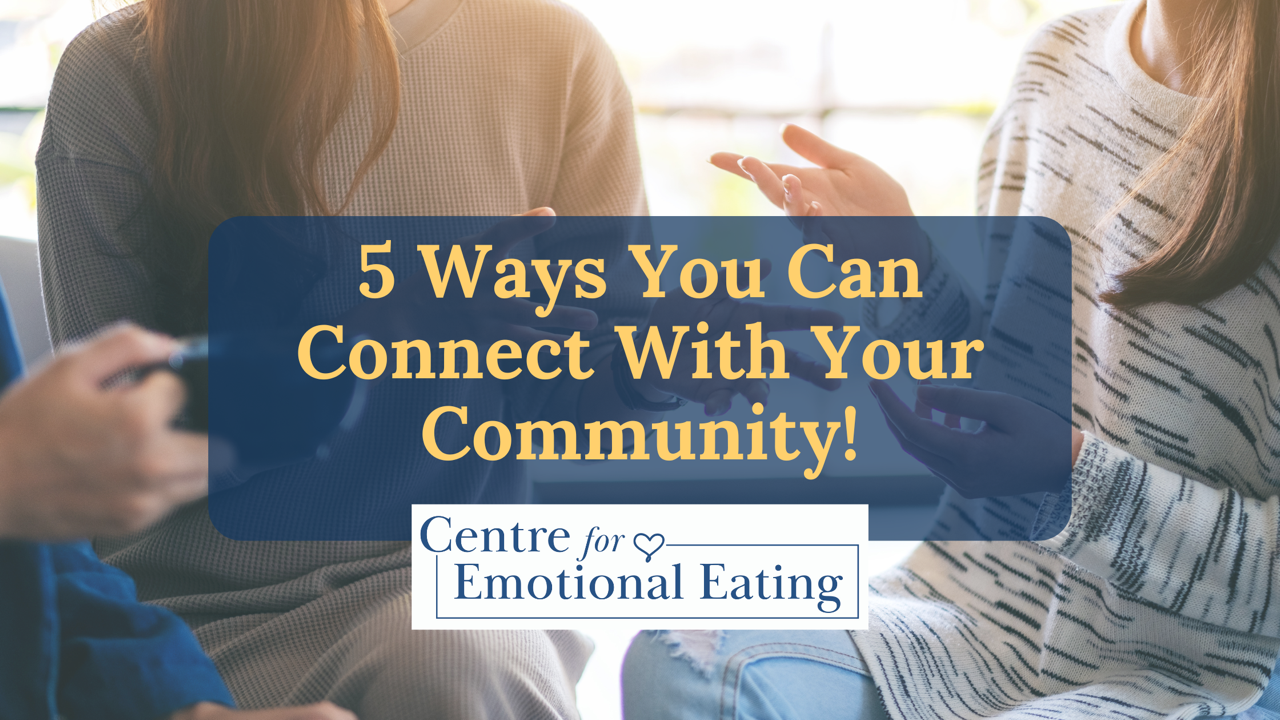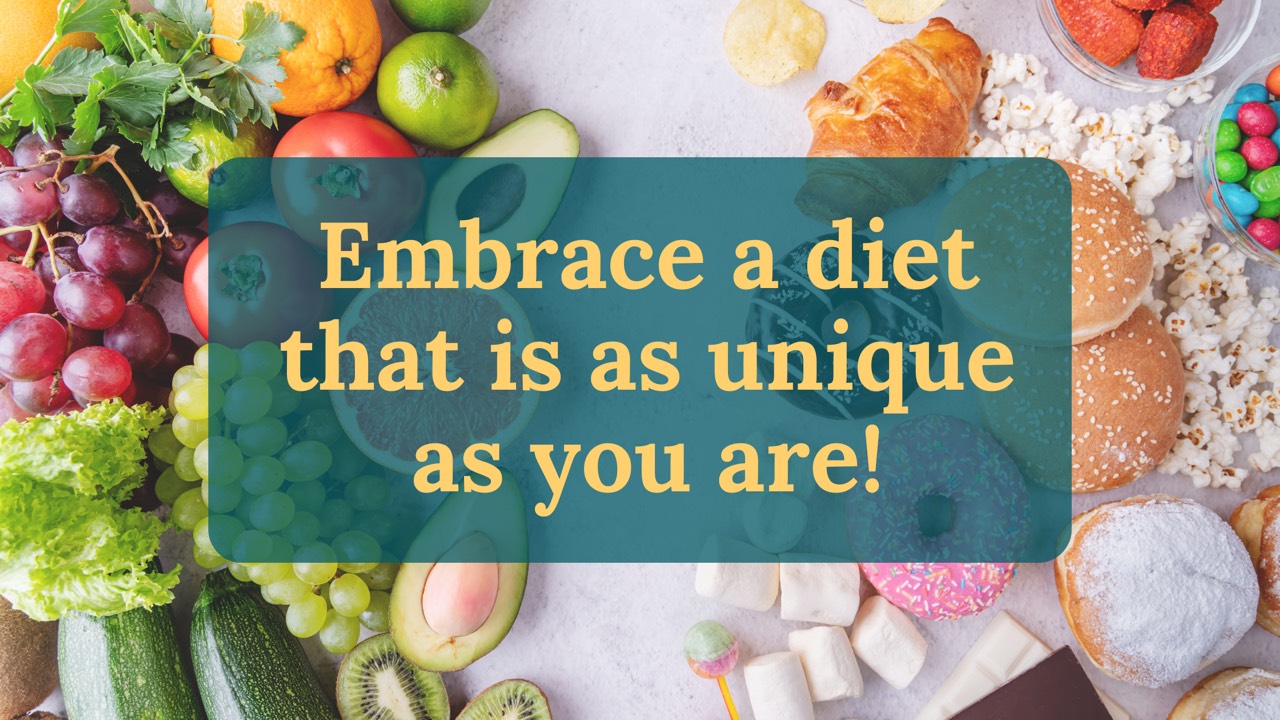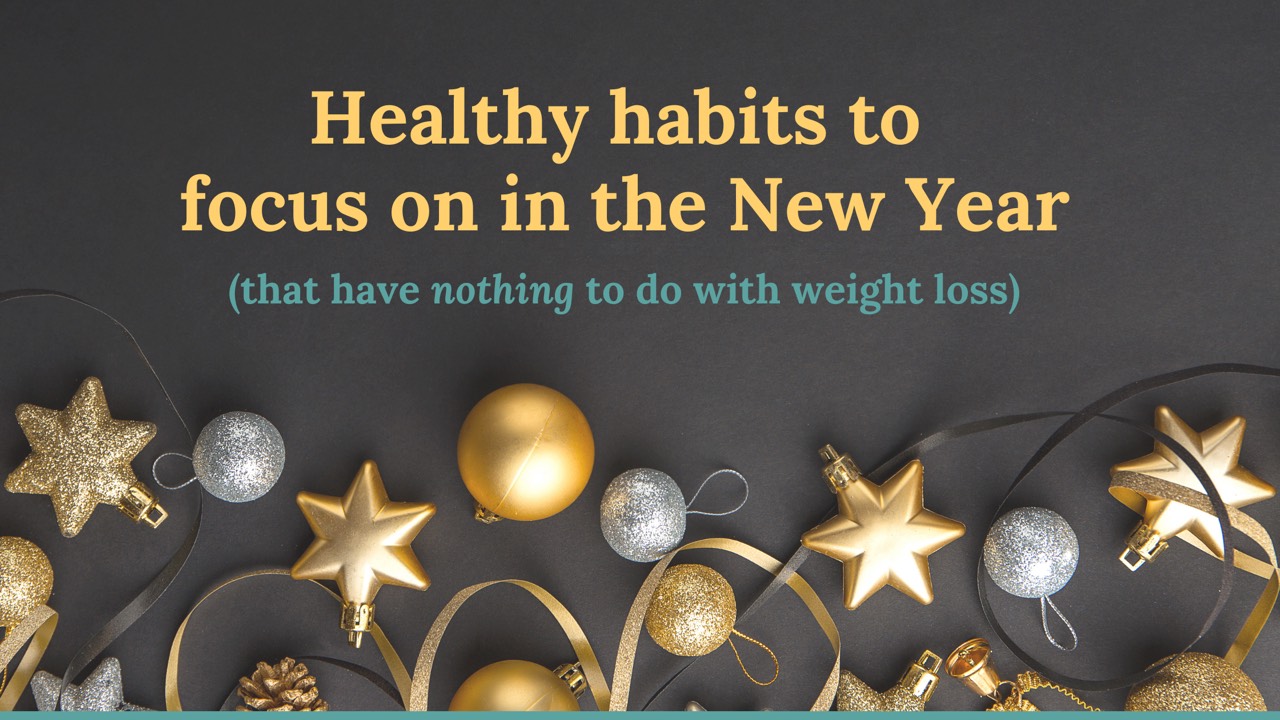BLOG
Find support not just for emotional eating, but all aspects of your well-being.
Changing Your Eating Patterns (Without it feeling like restriction)

Here at the Center for Emotional Eating we know that a restrictive diet is not a solution to anything: weight loss, peace of mind, fitting in. We’re not about restricting, but embracing (and eating!) the foods we like and make us feel our best.
So, what happens when there is a need to change your eating? Maybe you’ve developed a new food allergy or heartburn after eating certain foods. Maybe a bout of food poisoning or the flu means you just can’t face eating a specific item again. And did you know our taste buds change as we age? The meals and foods you’ve always relied on might not be as satisfying anymore. And satisfaction is key to avoiding binge eating!
Wanting to avoid these negative outcomes is perfectly human! But if you’ve been on the diet wagon a lot in your life, you might feel like removing specific foods feels a lot like new restrictive rules.
We’re here to help! Try these two steps to navigate your changing tastes without feeling like you’re slogging through new dietin...
Tapping into the Power of Community (For extroverts AND introverts!)

The restrictions from the pandemic has left many looking for a renewed sense of connection. Online get togethers got us through social distancing, but there seems to be a growing desire to meet up again in person.
You might be reading that and thinking “Not me! I thrived with more alone time”, and while that might be true (we all need opportunities to recharge) even introverts need a community they can tap into just as much as extroverts!
We’ve written before about how creating connection can help with feelings of loneliness (a major trigger for emotional eating), but getting a feeling of connection doesn’t have to mean a filled-to-the-brim calendar of social events. It is true that you can have a small circle of friends that you feel close to or be surrounded by many people and feel lonely. Connecting with others isn’t about the number of people you interact with or events you attend, it’s how it makes you feel! So, here are some ideas for you to try out in your own life to create c...
What is a Non-Diet Approach? (And how to get there!)

A non-diet approach can mean freedom from:
… food rules.
… an obsession with weight and body measurements.
… grueling workouts you hate.
… guilt and shame around what you choose to eat.
Sounds pretty good, right?! Our bodies are so much more than calories in/calories out. Even if you worked out and ate the exact same as your friend, you both would still look and feel different. In fact, a non-diet approach acknowledges that every person’s body is different and there is no one-size-fits-all way of eating or looking (the opposite of what diet culture wants you to think!).
A non-diet approach believes that every person is unique and that your body knows what it best for it—this goes for eating and movement. You might have come across terminology like “intuitive eating” or “mindful movement”, which is just a way of saying that you turn inwards to be aware of your own needs and bodily cues. For example, your cravings could reveal vitamin deficiencies or you might find certain movement...
3 New Year’s Resolutions That Aren’t About Your Weight

January always has that fresh feeling! There are 12 months to come and the possibilities feel endless. This might give you the knee-jerk feeling to set all the goals, including weight loss ones. You might be thinking, in this atmosphere that feels like anything is possible, that *this* year is the one you “lose the weight for good.” You’ve made a grocery list, thrown out the last of the holiday foods, and you signed up for that new gym membership.
But did you know that about 95% of diets fail? January might feel new and exciting, but many weight loss resolutions end before it even becomes February. That’s because restriction sets you up for binge eating—it becomes a cycle where you are depriving yourself “on the wagon” and then feel out of control when you give into cravings.
Instead of focussing on the number on the scale, here are examples of New Year’s resolutions to support your mind, body, and soul!
Add happiness habits.
You’ll notice this one is about adding in new things, in...
4 Self-Care Tips to Manage Seasonal Affective Disorder (SAD)

Seasonal Affective Disorder, or SAD, will look a little different for everyone. But if you notice you’re more irritable, your sleeping or eating patterns have changed, or you’re more anxious or depressed, you might be experiencing SAD.
We’re sharing four things that can help you find a mood boost in the darkest, coldest days of winter. We recommend creating a list you can easily reference, either in a notebook or on your phone’s notes app, of things that make you feel good. Either take inspiration from the ideas below or brainstorm your own! Personalizing an approach to support yourself through the next few months is a great way to show yourself some love.
Support
This can come in many forms, like a regular coffee date with a friend, scheduled therapy sessions, or speaking to your doctor about medication. Consider who in your life makes you feel supported and tap into that! If you feel intimidated going to the doctor, read this blog post for a little confidence boost.
Hygiene
When...
What is Holiday Perfectionism? (And How to Let Go if It!)

Holiday movies and social media show us that the holiday season needs to be a certain level of perfect: everyone must be happy, your house must be spotless but also have decorations everywhere, and key memories have to be made. This is what is considered holiday perfectionism, when everything must be done to a certain level or else you feel stressed out, disappointed in yourself, or like a failure.
Women are especially susceptible to falling into the trap of holiday perfectionism because they constantly get messages from childhood to be everything to everyone. They are the ones to make the gift lists, do the shopping, the baking, coordinate the social calendars of spouses and kids. Plus, there is a gender stereotype that women need to be pleasant in the face of any scenario. It is exhausting!
Give yourself a break this year with these 4 tips to feel less stressed about achieving perfection this season:
- Take stock of what you can let go of. Consider what you think is expected of yo ...
How to Find a Good Therapist (that’s a fit for you!)

Spending 50, or more, minutes opening up to a therapist can feel intense! It is understandable that you’d want to feel comfortable when talking about your emotions and trauma. Here are 4 things to consider when you’re searching for a mental health professional to work with:
Identify your needs
It can get confusing fast when looking at types of therapy, what heck is Conative-behavioural Theory or Eye Movement Desensitization and Reprocessing? There is no need to deep dive into research about types of therapy (unless you want to!), but consider reading websites and blurbs about therapists to narrow down the support you’re looking for. For example, if you suffer from anxiety, then make sure it’s mentioned as an area of expertise in their bio. If you’re in Canada, try Psychology Today to search for a therapist or the American Psychology Association if you’re in the US.
Consider your needs
Do you feel shy about opening up or maybe you prefer hearing that others are experiencing similar ...
Examples of What to Say When a Doctor Only Focuses on Weight Loss

Going to the doctor can feel like more than just a chore. It might make your anxiety sky rocket as you face explaining your symptoms and feelings to someone you only see a handful of times a year.
If you exist in a body that doesn’t ‘fit’ into narrow definitions, like BMI, there might be added anxiety that you won’t be heard by those treating you because they can’t see past your body shape or weight. This is called weight bias in medicine. It is when a practitioner believes they know everything they need to know about you because you are classified as “overweight” or “obese” by their standards. They will often highlight or even pressure you to lose weight as a miracle cure-all to any and all issues.
That is simply not true.
Many people with higher body fat percentages live healthy lives with clean bills of health from blood work to digestion. And you deserve the same treatment from a practitioner that everyone else gets—to be seen, to be heard, to be understood.
Knowing all this...
4 Reminders for When Your Bathroom Scale Gets the Best of You

It can be so easy to get obsessed with the numbers on your bathroom scale and hop on/hop off every day or sometimes multiple times a day. You might be telling yourself that it’s “just to check in” but let’s look at your motivation a bit more closely:
If the number on the scale is higher than yesterday, do you have a bad day? End up picking yourself apart and vow to restrict what you eat?
Are you stepping on the scale more than once a day? Do you have set ‘rules’ for when you weigh yourself (for example, must be after using the washroom, must be without clothing, etc.)?
If you find yourself letting the number on the scale dictate your mood and actions, here are four reminders you need to hear. Feel free to print these out to read them when you need to, or even tape them on your bathroom mirror!
- It is normal for your weight to fluctuate during the day depending on what you’ve had to eat, drink, or if you’ve had a bowel movement. And if you’re a woman, you can expect your weight to ...
The Solution to Eating out of Loneliness? Connection!

You might think of emotional eating as something that comes up for you when you have strong feelings like anger, stress, or sadness. These are emotions that are usually easy to identify by your inner dialogue or your outward reactions like tears or yelling. But emotional eating can sneak in with all kinds of feelings.
Ones you may not have thought about is eating when you’re bored or lonely. These reasons for overeating can be challenging to identify because we often do them without any sense of awareness. You’re not feeling overly emotional and yet you find yourself walking the same route to the fridge or pantry thinking it is simply routine.
When you’re bored or lonely, food as a solution to missing a connection makes sense. Your favorite treats feel comforting, plus they are easily available—it never lets you down or doesn’t show up (like you might be feeling about people).
The first thing to do is to find out what kind of connection you’re looking for: is it a social connection ...


